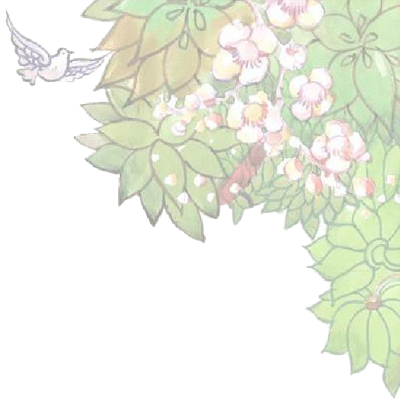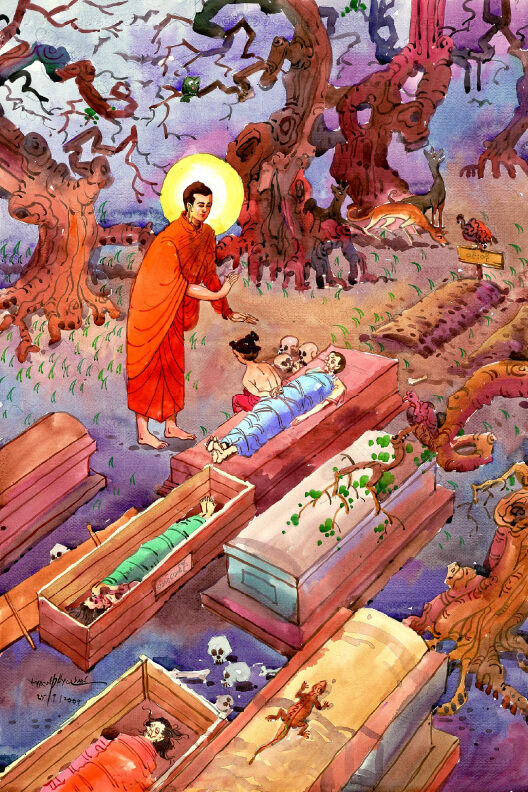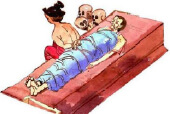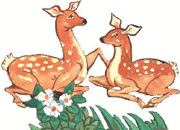35話 墓場のソーパーカ ・・・・ 七歳の阿羅漢

第4部 ブッダをめぐる人々
第1章 さまざまな男たち
35話 墓場のソーパーカ ・・・・ 七歳の阿羅漢

ブッダ在世当時のあるとき、ラージャガハ(王舎城)の墓守の家に男の子が生まれた。その子の名はソーパーカ。生後四か月で父親が病気で急死した。それで、かわいそうなソーパーカはおじさんの家に引き取られて、育てられることになった。そこでは、いとこにあたるおじさんの子といっしょだった。しかしながら、おじさんは自分の息子しか愛さず、ソーパーカには残酷で、不親切で、意地悪だった。母親が不在のときはいつでも、ちいさなソーパーカは、心やさしく、無邪気で、行儀がよいのに、つねにおじさんに叩かれ、叱られるのだった。
ある日、ソーパーカはいとこと喧嘩した。おじさんは怒って、こう考えた。
「あいつはわしの息子と喧嘩しやがった。まったく、ほんとうに迷惑な奴だ! あいつをたたき出さない限り、この家には平和がない。しかし、母親はあいつをとても愛している。母親があいつのそばにいるあいだは何もできん。このわしのもくろみを実行するのに、ちょうどいいときを見つけよう」
ある日の夕方、おじさんがソーパーカを招き寄せた。
「わしの大事な息子よ、今夜の天気は暑くもなく寒くもないだろうな。ちょっと外に散歩に出かけて新鮮な空気を吸おうか」
七歳のソーパーカは、おじさんが突然とてもやさしくなり、猫なで声で話すのにびっくりした。そこで、こう考えた。
「ああ、たしかにこれはお母さんのせいだろうな。お母さんがおじさんに、わが子と同じようにぼくを扱って、と頼んでくれたのかもしれない。もし、ぼくがおじさんにやさしくしたら、お母さんもうれしいだろう。ぼくは、お母さんをがっかりさせないようにしよう」
このように思って、ソーパーカはおじさんの後に必死でついていった。
街をいくらか歩きまわった後、おじさんは街の外の墓地の方へ向かって行った。ソーパーカはこわかったのだが、おじさんの後について行くほかなかった。墓地の真ん中に着いたとき、ひどい悪臭のする腐敗した死体がいくつもあった。おじさんはソーパーカをつかみ、両手を一つの死体にしっかりくくりつけた。それからおじさんは、そこにソーパーカひとりを残して「獣たちに喰われてしまえ!」と言い放ったのである。ソーパーカは泣き出して、「ああ、おじさん、ぼくをひとりにして置いて行かないで、お願いだから! この腐りかけの死体にくくりつけないで! ああ、おじさん、ぼく、こわいよ! ああ、お願いだから、どうぞ家に連れて帰ってよ、おじさん!」と必死に訴えたが、おじさんは去って行った。
ソーパーカは縛られたひもを解いて逃げようとしたのだが、どうしてもできなかった。夜になって、あたりが暗くなり、こわくなってきた。それに死体の臭いは、まさに胸が悪くなるくらいだ。野生の獣が近寄ってきたり、木の枝から飛び立ったりしている。ザワザワと風が木の葉をゆらす。これらすべてが恐ろしく、身の毛がよだった。まもなくジャッカル(野狐)のうなり声が、次から次に遠くの方からきこえてきた。獲物をもとめて墓場の方へ、だんだん近寄ってくる。
ソーパーカはあらん限りの声で泣き叫んだが、涙は両目からひと粒も出ず、ちょうど夏に干上がったアチラヴァティー川のようであった。しかし冷や汗がしたたり落ち、全身ずぶ濡れになるまでになった。だがソーパーカが過去世に積んだ功徳のおかげで、あえてソーパーカを獲物にしようとするジャッカルはいなかった。
ソーパーカは打ちひしがれ、絶望を感じた。近くに誰も助けてくれる者がいなかったのだ。「おお、ぼくのどんな悪業が、墓地の真ん中で縛られているという、こんな結果をもたらしたのだろう? ぼくの親族か、それとも見知らぬ人でも、誰か親切にぼくを無事安全にしてくれる人がいないものだろうか?」と、ソーパーカは嘆いた。
まさにそのとき、世尊が、まばゆくかがやく光を墓地の暗闇のなかに送って、ソーパーカが繋がれている辺りを明るく照らした。世尊はかれを落ちつかせた。ソーパーカが心の落ちつきを取り戻したとき、世尊はやさしく語りかけられた。
「来たれ、おお、ソーパーカよ! 恐れるな! 如来(タターガタ)を見つめよ! わたしはそなたを助けています」
そしてブッダの偉大さによって、ソーパーカはやすやすと縛られていたひもを解くことができ、たちまち僧院の世尊がいらっしゃる香房の前に立っていた。そして過去世に積んだ功徳のおかげで、まさにその瞬間、真理(ダンマ)をさとることができて、預流者(ソーターパンナ)となったのである。
一方、家ではソーパーカの母がわが子を捜していた。おじさんが帰ってきたとき、こう尋ねた。
「あなたはソーパーカと出かけたんでしょ。でも、ひとりで帰ってきた。あの子はどこにいるの?」
気のないようすでおじさんは冷ややかに答えた。
「知らんなあ。わしからスルッとはぐれた後、先に帰った、と思っていたよ」
ソーパーカの母はひと晩中、眠れなかった。ソーパーカが無事なのか、気がかりでいっぱいだった。いなくなった息子のことを思って、大声で泣いた。朝早くに、彼女は、こう考えた。
「世尊はあらゆることを、過去であれ、現在も未来もご存じだ、といわれている。世尊のもとへ行って、いとしいあの子を見つけてください、とお願いした方がいい」
悲しみを隠せないまま彼女は僧院へ向かった。そこに着いたとき、世尊はみずからが持っておられる超自然の力で、ソーパーカの姿を彼女に見えないようにされた。世尊が彼女にきかれた。
「おお、そなたはなぜ泣きながらここへ来たのか?」
「おお、尊い方よ、わたしの息子のおじさんが昨晩、息子を街へ連れて行きました。でも、おじさんが帰ってきたとき、息子を連れていませんでした。息子はいなくなってしまった。いまも見つけることができません。帰っても来ません。おお、尊い方よ、どうかわたしの息子を見つけてくださいませ!」
そのとき、世尊は彼女を慰めて、次の偈を口にされた。
「こどもは避難の逃げ場として、そこに居るのではない。
父親も、親戚も、また同じだ。
死に襲われる者に、
親族も、避難の逃げ場は与えられない」 (ダンマパダ288)
世尊のことばを注意深くききながら、彼女は真理の本質を洞察することができ、預流(ソーターパッティ)果に達したのであった。他方、ソーパーカはさとりの階梯のさらに三段階を発展させ、世尊のことばの終わりには七歳にして阿羅漢に達したのである。その後すぐに世尊は、みずからの超自然の力でソーパーカの姿を母親に見せた。母親はたいへん喜び、息子にまた再会できて幸せだった。彼女は息子が僧団に入ることを許した。
しばらくしてから世尊は、ソーパーカがまだ二十歳より年下であるにもかかわらず、比丘の具足戒を授けることを望まれた。世尊は「一とは何か?」で始まる十段階の質問をされた。そして、ソーパーカの答えは「生きとし生けるものすべては栄養で支えられている」で始まる「童子の問い(クマーラパンハー)」(小部・小誦(クッダカパータ)4)として知られている。世尊はそうした答えに満足され、問答釈具足(パンハビャーカラヌーパサンパダー)を許された。
(訳注:「童子の問い」は「一とは何か?」から「十とは何か?」までの十問で、答えは順に、栄養、名と色、苦・楽・不苦不楽、四聖諦、五取蘊、六内処、七覚支、聖八正道、九有情居、十の支分をそなえた阿羅漢。「童子の問い」は簡潔ながら透徹した明智による教理問答と見られる)
※ 画像やテキストの無断使用はご遠慮ください。/ All rights reserved.

EPISODE 35 Sopāka, THE SEVEN-YEAR-OLD ARAHANT
Once, during the Buddha’s life time, there was born in Rājagaha a baby boy in the family of a cemetery-keeper. The child was called Sopāka. It was four months after his birth when his father was suddenly ill and died. Then, the poor Sopāka was adopted and brought up by his uncle; there, he stayed together with his cousin. However, his uncle only loved his own son, but he was cruel, unkind, and wicked to him. Whenever his mother was away, the little Sopāka, who was kind, innocent and well-behaved, was always beaten and scolded by his uncle.
One day, Sopāka quarrelled with his cousin. His uncle became angry and thought: “This boy quarrelled with my son. He is indeed an annoyance to us! There will be peace in this house only after I kick him out. But his mother loves him very much, and I cannot do anything while she is beside him. I shall find the right time to execute my plan.”
One evening, his uncle invited him: “My dear son, this evening the weather is neither too hot nor too cold. Let us take a walk outside to get some fresh air.”
The seven-year old Sopāka was surprised that his uncle suddenly became very kind and spoke softly to him. He thought: “O, surely this is because my mother. She may have asked him to treat me well like his own son. If I am kind to my uncle, my mother will also be happy. I will not disappoint my mother.” Having considered thus, he eagerly followed his uncle walking around.
After walking around the city for some time, his uncle led him outside the city towards a cemetery. Although Sopāka was afraid, he had no way but to follow him. When they reached the middle of the cemetery, where there were some rotten corpses with a very bad smell, his uncle grabbed him, bound his hands and tied him fast to a corpse. Then, his uncle left him alone there, saying: “Let the beasts eat!” Sopāka started crying and calling him: “O uncle, do not leave me alone, please! Do not tie me to this rotten corpse! O uncle, I am afraid! O please uncle, please take me home, uncle!”
Sopāka tried to release himself from the bonds, but his efforts were in vain. At night, the surrounding became very dark and frightening, and the smell of dead bodies was really sickening. Wild beasts approached and knocked off branches; the wind rustled the leaves. All this frightened him so much that his hair stood up on its end. Soon, the sound of jackals howling one after another was heard in a distance; they came nearer and nearer to the cemetary in search of prey. He was crying as loud as he could, but no more tears rolled down from his eyes just like the dry Aciravatī River in the summer. But, cold sweat trickled down and soaked his body until it was entirely wet. But due to the fruit of his past merits, no jackals dared to prey on him.
He felt desperate and hopeless. He found no one near to help him. He lamented: “O, what wrong act of mine leads to this result, being bound in the middle of a cemetery? Is there anyone, my relatives or strangers, who can favour me safety?”
At that time, the Blessed One sent His brilliant light of glory, glowing in the darkness of the cemetery, where Sopāka was tied. The Blessed One calmed him. After Sopāka regained his mindfulness, the Blessed One spoke kindly: “Come, O Sopāka! Do not be afraid! Behold the Tathāgata! I am helping you.”
And by the greatness of the Buddha, Sopāka could easily break his bonds and instantly stood before the Blessed One’s Fragrant Chamber. And supported by his past merits, that very moment he could realise the Dhamma and became a Sotàpanna.
At home, Sopāka’s mother was looking for his son. When his uncle came home, she asked: “You went out with Sopāka, but now you came back alone. Where is my son?”
He replied unsympathetically: “I don’t know. I thought he has come back after slipping away from me.”
The whole night, Sopāka’s mother could not sleep. Her mind was full with worry for Sopāka’s safety. She cried a lot, thinking of his lost son. In the early morning, she thought: “It’s said that the Blessed One knows all matters, whether past, future and present. I’d better go to the Blessed One and ask Him to show my beloved son.”
Still unable to hide her sorrow, she proceeded to the monastery. When she arrived, the Blessed One, by His supernormal power, made Sopāka invisible to her.
The Blessed One asked: “O sister, why do you come here weeping?”
She answered: “O Lord, my son’s uncle had taken him walking around the city yesterday evening. But when he returned home, he came without my son. My son is lost, and I still could not find him until now. Nor has he come back to me. O Lord, please show me my son!”
Then, the Blessed One consoled her by uttering a stanza: “No sons are there for refuge, nor can father and close relatives protect one assailed by death; indeed neither kith nor kin can give refuge.”
Listening to the Blessed One’s words attentively, she could penetrate the essence of the Dhamma and attain the Fruition of Stream-Entry (Sotāpatti). Meanwhile, Sopāka developed the three higher Paths that at the end of the discourse he attained Arahantship at the age of seven. Thereupon, the Blessed One withdrew His supernormal power and revealed Sopāka’s presence to his mother. The mother was very happy to see her son again; she allowed him to enter the Order.
Some time later, the Blessed One wished to confer on Sopāka the higher ordination as he had attained Arahantship, even though he was still under twenty years old. The Blessed One put ten gradual questions to him, beginning with “What is one?”, and he answered the question beginning with “All creatures subsist by nutriment”, which was known as the “kumārapañhā”. The Blessed One was satisfied with the answers and allowed Venerable Sopāka’s higher ordination (pañhabyākaraṇūpasampadā).
※ 画像やテキストの無断使用はご遠慮ください。/ All rights reserved.
アシン・クサラダンマ長老
1966年11月21日、インドネシア中部のジャワ州テマングン生まれ。中国系インドネシア人。テマングンは近くに3000メートル級の山々が聳え、山々に囲まれた小さな町。世界遺産のボロブドゥール寺院やディエン高原など観光地にも2,3時間で行ける比較的涼しい土地という。インドネシア・バンドゥンのパラヤンガン大学経済学部(経営学専攻)卒業後、首都ジャカルタのプラセトエイヤ・モレヤ経済ビジネス・スクールで財政学を修め、修士号を取得して卒業後、2年弱、民間企業勤務。1998年インドネシア・テーラワーダ(上座)仏教サンガで沙弥出家し、見習い僧に。詳しく見る
奥田 昭則
1949年徳島県生まれ。日本テーラワーダ仏教協会会員。東京大学仏文科卒。毎日新聞記者として奈良、広島、神戸の各支局、大阪本社の社会部、学芸部、神戸支局編集委員などを経て大阪本社編集局編集委員。1982年の1年間米国の地方紙で研修遊学。2017年ミャンマーに渡り、比丘出家。詳しく見る

※ 画像やテキストの無断使用はご遠慮ください。
All rights reserved.

